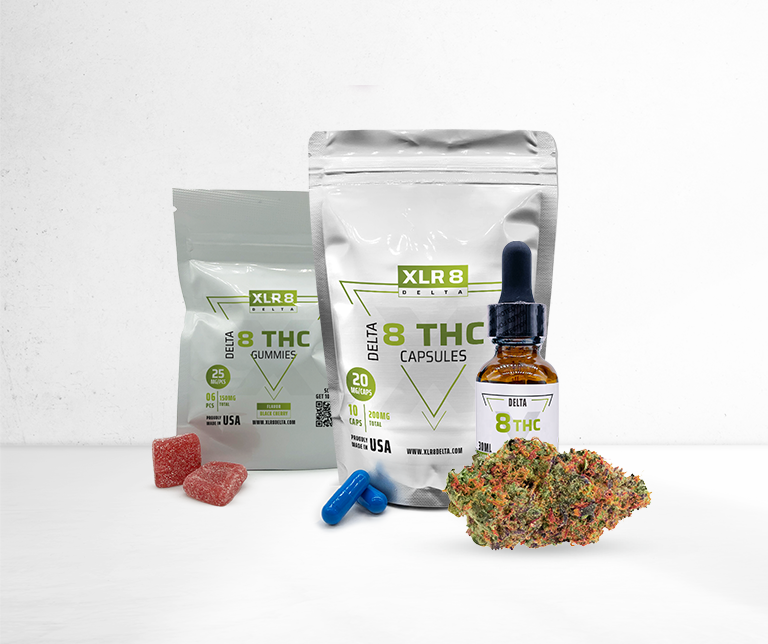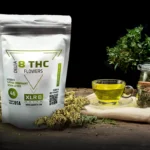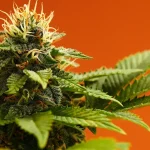Delta-8-tetrahydrocannabinol (Delta 8 THC) has recently emerged as a popular cannabinoid, offering a milder psychoactive experience compared to its more well-known counterpart, Delta 9 THC. As interest in Delta 8 continues to grow, many are curious about how this intriguing compound is created.
From its origins in the cannabis plant to the sophisticated processes used to extract and refine it, understanding the creation of Delta 8 provides valuable insight into its unique properties and benefits. In this blog, we’ll explore the journey of Delta 8, from the plant to the final product, shedding light on the science and methods behind its production.
The Processes Required to Produce Delta 8
Extraction of CBD
Methods of CBD Extraction
CO2 Extraction
This technique involves using carbon dioxide (CO2) to extract cannabinoids from hemp. By applying pressure, CO2 is turned into a liquid, allowing it to act as a solvent that draws cannabinoids from the plant material. After the extraction, the CO2 reverts to its gaseous form, resulting in a pure cannabinoid extract.
Solvent Extraction
Solvents such as ethanol, butane, or propane are used to extract cannabinoids from hemp. The plant material is soaked in the solvent, which dissolves the cannabinoids. The solvent is then evaporated, leaving behind the cannabinoid extract.
Ethanol Extraction
Ethanol is used to wash over the hemp, extracting CBD along with other cannabinoids and terpenes. Post-extraction, the solvent is evaporated, leaving behind pure CBD extract.
The Role of CBD
CBD, a non-psychoactive compound, is the primary precursor for Delta 8 THC. It is abundant in hemp and serves as the starting material due to its chemical structure, which can be modified to produce Delta 8 THC.
Isomerization of CBD
Isomerization is the chemical process of converting one molecule into another molecule with the same atoms but in a different arrangement. In this case, CBD is converted into Delta 8 THC.
Steps in Isomerization
- Chemical Reaction: CBD undergoes a chemical reaction facilitated by a catalyst. This process rearranges its molecular structure.
- Catalysts: Common catalysts include acids (like hydrochloric acid) or metal catalysts. These substances speed up the reaction, ensuring efficient conversion.
The Role of Catalysts
Catalysts are crucial in the isomerization process as they help convert CBD into Delta 8 THC more efficiently. An acidic catalyst is typically used, promoting the rearrangement of the molecular bonds in CBD to form Delta 8 THC.
Refining and Purification
After isomerization, the resulting Delta 8 extract contains impurities and other unwanted compounds. Refining and purification are necessary to obtain a high-quality, pure Delta 8 product.
Methods of Refinement
- Chromatography: This technique is widely used to purify Delta 8 extract. It involves passing the extract through a chromatography column, which separates compounds based on their chemical properties.
- Purification Steps: The extract is dissolved in a suitable solvent and passed through the column. Different compounds travel at different speeds, allowing for the separation and removal of impurities.
The refined extract is a more concentrated and pure form of Delta 8 THC, ready for further use in various products such as edibles, tinctures, and vapes.
What is Delta 8 THC?
One of the lesser-known cannabinoids in the cannabis sativa plant is Delta-8 THC. Unlike other cannabinoids, Delta-8 THC is not abundant in the plant and requires manufacturing from hemp-derived CBD to obtain significant amounts, as noted by the FDA.
Chemically, Delta-8 THC shares similarities with Delta-9 THC, the compound responsible for the intoxicating effects associated with cannabis use. However, Delta-8 THC is less potent than Delta-9 THC, which is why it is sometimes referred to as Delta-9 THC’s “lesser-known counterpart.”
Despite being less potent, Delta-8 THC offers many of the same experiential benefits as Delta-9 THC. Users often report feelings of relaxation, euphoria, and pain relief. Additionally, Delta-8 THC is known for having fewer adverse effects, making it an appealing option for those seeking the benefits of THC without the intensity or potential side effects of Delta-9 THC.
Differences Between Delta 8 THC and Delta 9 THC
Delta-8 THC and Delta-9 THC are two distinct cannabinoids found in the cannabis plant, each with its unique effects, legal status, and availability. Understanding these differences is crucial for making informed decisions about their use.
Chemical Structure and Effects
Delta-8 THC is a minor cannabinoid with a chemical structure similar to Delta-9 THC. However, the slight differences in molecular structure result in distinct effects. Delta-8 THC is known for providing a clearer and more focused high, which is less anxiety-inducing compared to Delta-9 THC. This makes it a more comfortable option for users seeking a functional high without intense psychoactive effects.
Legal Status and Availability
Delta-8 THC is legal in most states in the United States, although it is still a relatively new and uncommon product. In contrast, Delta-9 THC is illegal under federal law but is legal for medical and/or recreational use in some states. This legal distinction affects the availability of products, with Delta-8 THC being more accessible in regions where Delta-9 THC is restricted[1][3].
Key Differences
Delta-8 THC and Delta-9 THC differ significantly in terms of potency, anxiety-inducing effects, and availability. Delta-9 THC is generally more potent and intense, delivering a stronger high compared to Delta-8 THC.
Delta-8 THC is reported to have lower levels of anxiety and paranoia compared to Delta-9 THC, making it a more comfortable option for users. In terms of availability, Delta-8 THC is legal in most states, while Delta-9 THC is illegal under federal law but legal in some states for medical and/or recreational use.
Choosing Between Delta-8 and Delta-9
When choosing between Delta-8 THC and Delta-9 THC, several factors should be considered. First, intensity preference plays a significant role, as Delta-8 THC offers a milder, more functional high, whereas Delta-9 THC provides a more intense, classic marijuana experience.
Additionally, legal considerations must be taken into account, as Delta-8 THC is legal in most states, while Delta-9 THC is illegal under federal law but legal in some states. It is crucial to ensure compliance with local regulations.
Furthermore, the time of day and intended use should also be considered. Delta-8 THC is well-suited for daytime use due to its clear-headed high, whereas Delta-9 THC is better suited for evenings or relaxation due to its stronger sedative effects.
Potential Benefits of Delta 8 THC
Appetite Stimulation
Research on delta-8-THC is still relatively limited compared to delta-9-THC, but there are some studies that provide insights into its effects on appetite. A study conducted on mice in 2004 found that low doses of delta-8-THC increased food intake significantly, suggesting that it could be an effective appetite stimulant.
The study noted that delta-8-THC had similar effects to delta-9-THC in increasing appetite but with potentially fewer psychoactive effects, making it an attractive option for those seeking appetite stimulation without intense euphoria or sedation.
Calming the Immune and Nervous Systems
Cannabinoids, including delta-8-THC, interact with the body’s endocannabinoid system (ECS), which plays a crucial role in maintaining homeostasis, including immune function. The ECS consists of cannabinoid receptors (CB1 and CB2), endogenous cannabinoids (endocannabinoids), and enzymes responsible for the synthesis and degradation of these endocannabinoids.
Delta-8-THC primarily binds to CB1 receptors, found abundantly in the central nervous system, but it also affects CB2 receptors, which are prevalent in immune cells. Activation of CB2 receptors by cannabinoids has been shown to modulate immune responses, reducing inflammation and promoting a balanced immune system.
Neuroprotective Properties
Acetylcholine is a neurotransmitter involved in many critical functions, including:
- Memory and Cognition: Acetylcholine plays a key role in memory formation and learning. It helps in the encoding of new memories and the retrieval of existing ones.
- Neuroplasticity: This is the brain’s ability to adapt and reorganize itself by forming new neural connections. Neuroplasticity is essential for learning and recovery from brain injuries.
- Arousal and Attention: Acetylcholine influences alertness and the ability to focus, making it vital for maintaining attention and cognitive clarity.
Studies suggest that delta-8-THC may promote the production of acetylcholine, thereby supporting these critical cognitive functions. This can have significant implications for conditions characterized by cognitive decline, such as Alzheimer’s disease, where acetylcholine levels are typically reduced.
Pain Management Effects
Anecdotal reports from users of delta-8-THC suggest that it may be effective in managing various types of pain, including:
- Chronic Pain: Users have reported relief from long-term pain conditions, such as arthritis and neuropathic pain, where traditional pain medications may have limited effectiveness.
- Acute Pain: Some individuals have found delta-8-THC helpful in managing acute pain episodes, such as migraines or injury-related pain.
- Cancer-Related Pain: Patients undergoing cancer treatments have noted that delta-8-THC helps mitigate pain associated with cancer and its treatments, potentially improving their quality of life.
The activation of CB1 receptors by delta-8-THC can lead to several changes in the nervous system’s response to pain:
- Inhibition of Pain Transmission: By binding to CB1 receptors, delta-8-THC can inhibit the release of certain neurotransmitters involved in pain transmission, such as glutamate and substance P. This can reduce the overall intensity of pain signals reaching the brain.
- Activation of Pain-Modulating Pathways: Delta-8-THC can activate descending pain-modulating pathways in the brain, which can dampen the perception of pain. These pathways involve endogenous opioids and other neurotransmitters that naturally help to reduce pain.
- Anti-inflammatory Effects: Although primarily interacting with CB1 receptors, delta-8-THC can also influence CB2 receptors found in immune cells. Activation of CB2 receptors can reduce inflammation, which is often a significant contributor to chronic pain. By decreasing inflammation, delta-8-THC can help alleviate pain caused by inflammatory conditions.
Frequently Asked Questions
Is Delta 8 legal?
The legality of Delta 8 THC varies by region. In the United States, the 2018 Farm Bill legalized hemp and its derivatives, including Delta 8 THC derived from hemp. However, some states have specifically banned Delta 8 THC, so it’s important to check local laws before purchasing or using it.
Can Delta 8 make me high?
Yes, Delta 8 THC can make you high, but the psychoactive effects are generally milder compared to Delta 9 THC. Users often report a more clear-headed and less intense high, making it a popular choice for those seeking the benefits of THC with fewer side effects.
How can I consume Delta 8 THC?
Delta 8 THC can be consumed in various forms, including:
- Vaping: Delta 8 THC vape cartridges and disposable pens are popular for their fast-acting effects.
- Edibles: Gummies, chocolates, and other edible products infused with Delta 8 THC offer a convenient and tasty way to consume it.
- Tinctures: Delta 8 THC tinctures can be taken sublingually (under the tongue) for rapid absorption.
- Capsules: These provide a discreet and precise way to consume Delta 8 THC.
- Topicals: Creams and balms infused with Delta 8 THC can be applied directly to the skin for localized relief.
Each method of consumption has its own onset time and duration of effects, so users can choose based on their preferences and needs.
Where is the best place to buy Delta 8 THC products online?
XLR8 Delta is a reputable online store known for selling federally legal Delta 8 products. They provide Certificates of Analysis (COAs) to prove the potency and purity of their products, ensuring quality and safety. XLR8 Delta offers affordable Delta 8 goods without compromising on quality, making them a trusted choice for consumers seeking reliable options.
References:
Immunomodulatory effects of orally administered cannabinoids in multiple sclerosis; J. Killestein a, E.L.J. Hoogervorst a, M. Reif b, B. Blauw c, M. Smits c, B.M.J. Uitdehaag a, L. Nagelkerken c, C.H. Polman (https://www.sciencedirect.com/science/article/abs/pii/S0165572803000456)
Reduction of hippocampal acetylcholine turnover in rats treated with (-)-delta 8-tetrahydrocannabinol and its 1′,2′-dimethyl-heptyl homolog; A V Revuelta, D L Cheney, E Costa, N Lander, R Mechoulam (https://pubmed.ncbi.nlm.nih.gov/6249445/)
Very low doses of delta 8-THC increase food consumption and alter neurotransmitter levels following weight loss; Yosefa Avraham, Dikla Ben-Shushan, Aviva Breuer, Olga Zolotarev, Avital Okon, Nir Fink, Vered Katz, Elliot M Berry (https://pubmed.ncbi.nlm.nih.gov/15099912/)




